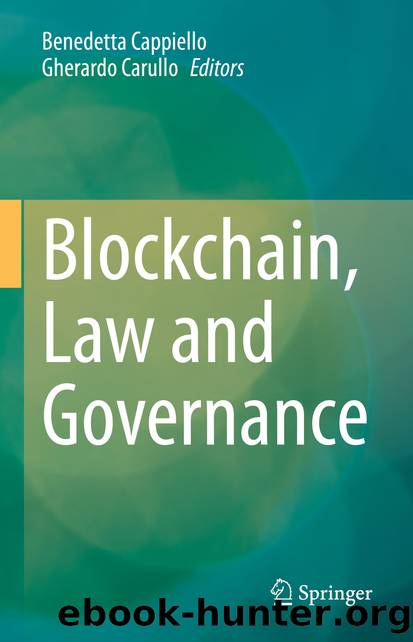Blockchain, Law and Governance by Unknown

Author:Unknown
Language: eng
Format: epub
ISBN: 9783030527228
Publisher: Springer International Publishing
5 Regulatory Contract Law
Our point is that the rules governing blockchains have been adopted by private self-regulation and, specifically, by coordination among users. Additionally, it appears that the coordination is pursued by relying on a quite peculiar example of regulatory contract law.52
This situation inevitably leads to a subversion of the constant conception of the sources of law, which, from the original setting according to which the legal system finds its validity exclusively in compliance with the procedures for the formation of standards, comes to recognize its main factor of innovation. In such a context, the contract takes over the role traditionally reserved to the law in the direction of socio-economic phenomena by assuming a regulatory function.53
Private autonomy is the humus from which norms sprout: this is par excellence in the hypothesis of contractual norms, but this concerns customary norms, as ascribable to the same subjects who observe them. As an author observes with respect to the lex mercatoria, contract law is the medium for excellence for trading across borders.54 In particular, scholars have clearly recognised the role of contractual governance from an historical perspective.55
Here the point is that the reliance on contract and contracting in governing blockchains remains, in any case, a common and central element to the networks.56 Alongside the contract, which assume particular forms in blockchains, there are additional factors, such as conventions, customs, effectiveness.57 In the words of an author, in blockchains âthe legal framework is essentially pushed down to the level of the contractâ. The goal is ânot lawlessness and anarchy, but that legal frameworks become more granular and personalized to the situationâ.58
Specifically, blockchains grounds on the concept of rough consensus. In particular, Lessig notes âWe reject kings, presidents and voting. We believe in rough consensus and running codeâ.59 Now, in blockchains, âconsensusâ means that the nodes on the network agree on the same state of the chain, in a sense making it a self-auditing ecosystem. Specifically, consensus protocols allow a blockchain to be updated, while ensuring that every block in the chain is true as well as keeping participants incentivized.
Thus, nodes, developers and others govern blockchains by agreement. This ârough consensusâ is primarily used, for example, to achieve the necessary agreement on a single data value or a single state of the network among distributed processes or multi-agent systems, such as cryptocurrencies.
Interestingly, consensus decision-making is a creative and dynamic way of reaching agreement between all members of a group. Instead of simply voting for an item and having the majority of the group get their way, a group using consensus is committed to finding solutions that everyone actively supports, or at least can live with.
This consensus is algorithmic because it represents a process in computer science used to achieve agreement on a single data value among distributed processes or systems. Interestingly, users agree because they rely on the code itself, namely the technology.
In brief, consensus mechanisms are protocols that make sure all nodes (a device on the blockchain that maintains the blockchain and, sometimes, processes
Download
This site does not store any files on its server. We only index and link to content provided by other sites. Please contact the content providers to delete copyright contents if any and email us, we'll remove relevant links or contents immediately.
Blockchain Development for Finance Projects by Ishan Roy(1338)
Mastering Blockchain by Daniel Cawrey & Lorne Lantz(831)
Crypto Dictionary by Jean-Philippe Aumasson(763)
Crypto Asset Investing in the Age of Autonomy by Jake Ryan(558)
Blockchain Chicken Farm by Xiaowei Wang(514)
Bitcoin & Cryptocurrency Technologies: Bitcoin Mining, Blockchain Basics And Cryptocurrency Trading & Investing For Beginners | 7 Books In 1 by Weiser Boris & Weiser Boris(487)
Advances in Cryptology â CRYPTO 2019 by Unknown(482)
Cyber Security for Cyber Physical Systems by Saqib Ali Taiseera Al Balushi Zia Nadir & Omar Khadeer Hussain(474)
Blockchain and Cryptocurrency: 2 Books in 1: Blockchain Basics & Cryptocurrency for Beginners. The Complete Guide for Beginners to Understand Blockchain Technology and Start Cryptocurrency Investing by Trend Richard(471)
Algorithms, Blockchain & Cryptocurrency by Gavin Brown(468)
The Promise of Bitcoin by Bobby C. Lee(438)
Mr Bitcoin by Dagada Mpho;(426)
Quantum Cryptography and the Future of Cyber Security by Chaubey Nirbhay(421)
Cryptocurrency 101: An Introduction To Bitcoin, Cryptocurrency, And The Blockchain by Finch Andy(406)
The Physics of Computing by Luca Gammaitoni(405)
Blockchain Success Stories by Sir John Hargrave(401)
Blockchain Startups: Bitcoin and Ethereum as the Frontier of Finance by King Stefan(399)
The Bitcoin Book: A Beginner's Guide to the Future of Finance by Underhill Matthew(392)
What The Raspberry Pi Is: Everything You Need To Know: Raspberry Pi 3 Advantages by Mosconi Rob(362)
